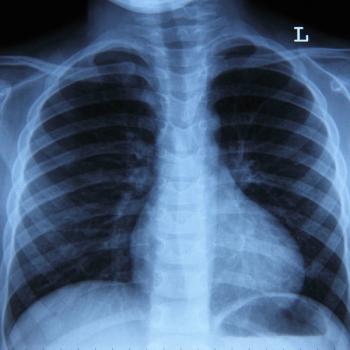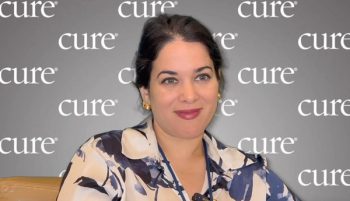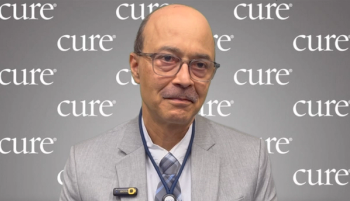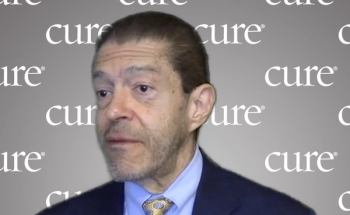
Patritumab deruxtecan treatment did not improve suvival end points versus those treated with chemotherapy in EGFR+ advanced/metastatic NSCLC.

Patritumab deruxtecan treatment did not improve suvival end points versus those treated with chemotherapy in EGFR+ advanced/metastatic NSCLC.

Kisqali plus aromatase inhibitor improved outcomes across age and menopausal status in early hormone receptor–positive, HER2-negative breast cancer.

The COCOON dermatologic management regimen reduced the quality-of-life impact of Rybrevant/Lazcluze vs SOC treatment in patients with EGFR-mutated NSCLC.

Akeega delayed cancer growth and symptoms in patients with castration-sensitive prostate cancer and HRR gene mutations.

Dr. Sarah Sammons discusses side effects associated with RLY-2608, and how it effects patients with HR-positive, HER2-negative advanced breast cancer.

Imlunestrant alone or in combination with Verzenios improved patient-reported outcomes in ER+, HER2– advanced breast cancer following endocrine therapy.

Dr. Alexander Chehrazi-Raffle discusses findings from the phase 3 TiNivo-2 trial, designed to evaluate treatment with Fotivda in patients with metastatic renal cell carcinoma.

Adding Enhertu to Perjeta improved time without cancer growth versus standard care in advanced HER2-positive breast cancer, as per data from DESTINY-Breast09.

Participation in a structured exercise program following surgery and adjuvant chemo improved key survival end points in stage 3 and high-risk stage 2 CRC.

Dr. Guru Sonpavde discusses the CheckMate 901 trial evaluating Opdivo plus Yervoy for those with cisplatin-ineligible, metastatic urothelial carcinoma.

Adding Imfinzi to fluorouracil-based chemo improved event-free survival and response rates in resectable gastric and gastroesophageal junction cancer.

Tecentriq and chemotherapy combination reduces the risk of death versus chemotherapy alone in deficient mismatch repair, stage 3 colorectal cancer.

Camizestrant and continued therapy with CDK4/6 inhibition benefits patients who present with ESR1-mutated, ER+, HER2– advanced breast cancer.

Adjuvant Opdivo, cisplatin and radiotherapy improved DFS vs other treatment among those with locally advanced squamous cell carcinoma of the head and neck.

Trodelvy plus Keytruda, when given in the frontline, extended survival without progression versus chemo plus Keytruda in PD-L1+ metastatic TNBC.

Second-line Enhertu improved key survival end points versus Cyramza plus paclitaxel for HER2+ gastric cancer or gastroesophageal junction adenocarcinoma.

Among patients with ESR1-mutant, ER+, HER2– advanced breast cancer, vepdegestrant improved survival without progression when compared with Faslodex.

Braftovi and Erbitux plus chemotherapy improved survival without progression over standard therapy in BRAF V600E-mutant mCRC in the first-line setting.

GLP-1 drugs lowered rates of obesity-related cancers and death versus DPP-4s, with no increased cancer risk, study finds.

Itovebi plus Ibrance and Faslodex improved overall survival in patients with PIK3CA-mutant, HR+, HER2–, endocrine-resistant breast cancer versus placebo.

Among patients with ES-SCLC, first-line maintenance therapy with Zepzelca plus Tecentriq led to improvements in PFS and OS versus Tecentriq alone.

Data show that patients’ multiple myeloma still fails to progress if patients receive less-frequent Tecvayli.

To ensure best outcomes, patients with chronic myeloid leukemia should maintain frequent communication with their care teams — even between appointments.

Most — though not all — side effects from chronic myeloid leukemia treatment improve over time, an expert said.

A chronic myeloid leukemia diagnosis can negatively affect patients and their loved ones’ mental health, but there are resources that can help.

Patients with chronic myeloid leukemia should be upfront with their care team about how treatment side effects are affecting their daily functioning.

Initial discussions about treatment, side effects and study results can help patients navigate through all aspects of a chronic myeloid leukemia diagnosis.

An advocate discusses vital patient-provider conversations to promote the best care for individuals with chronic myeloid leukemia.

For patients with non-small lung cancer and brain metastases, it’s important to consent to shaving the scalp before tumor-treating fields therapy.

Data from the MajesTEC-1 trial shows that patients with relapsed/refractory multiple myeloma responded to Tecvalyi for a median of two years and lived without disease progression for nearly a year.